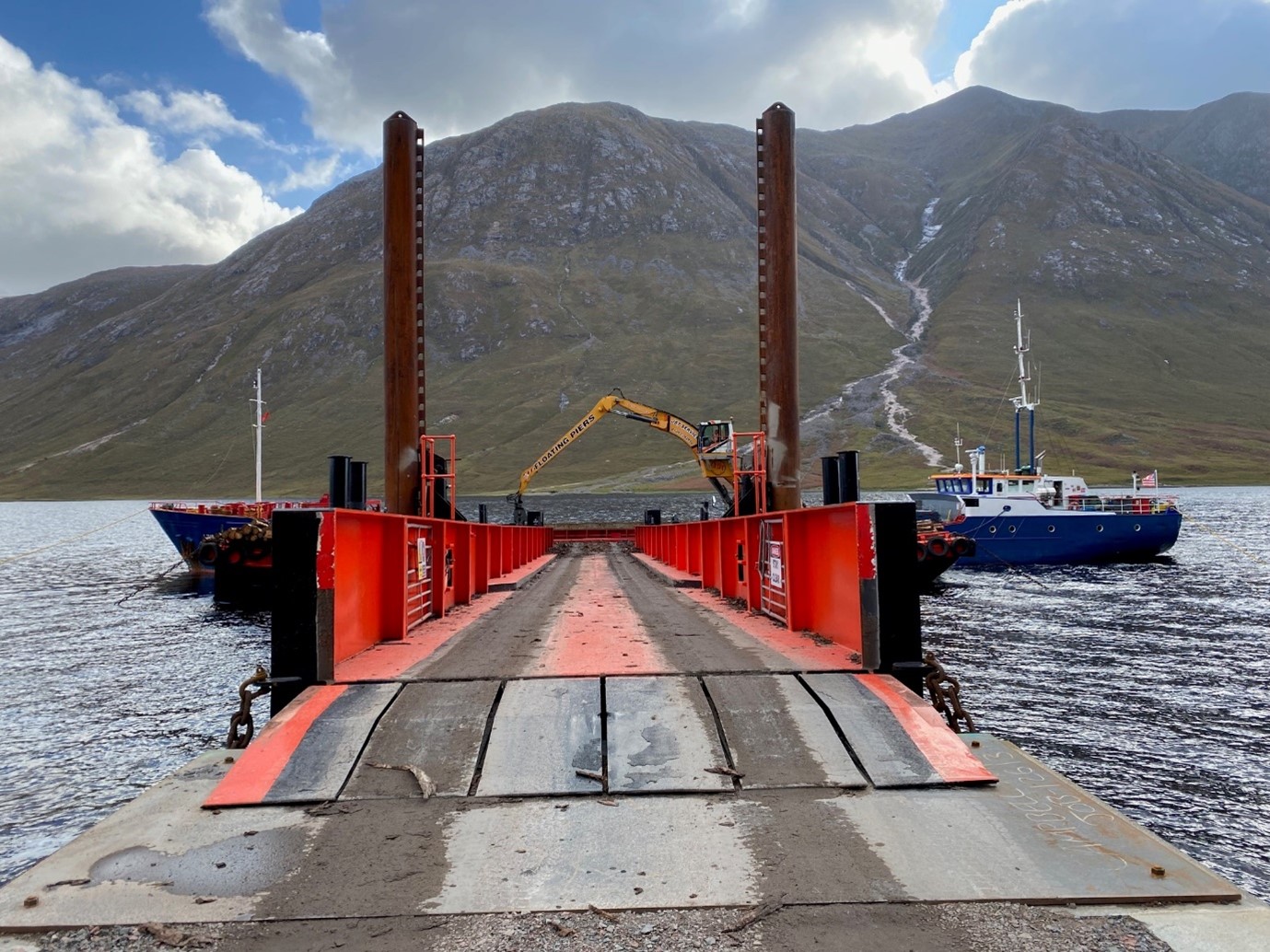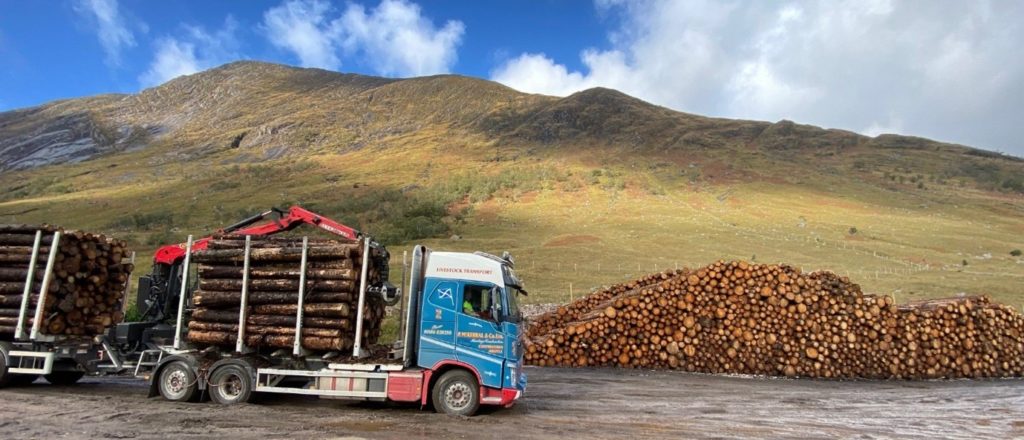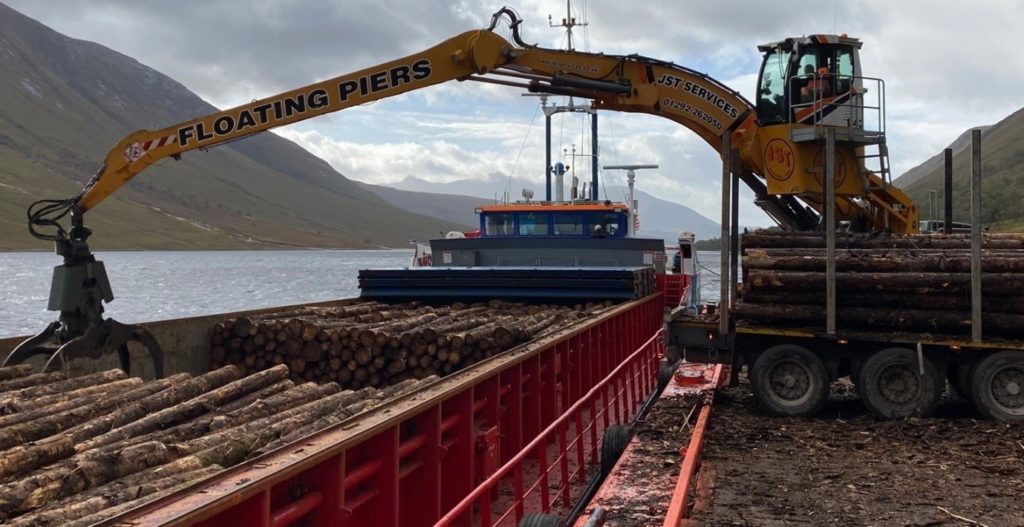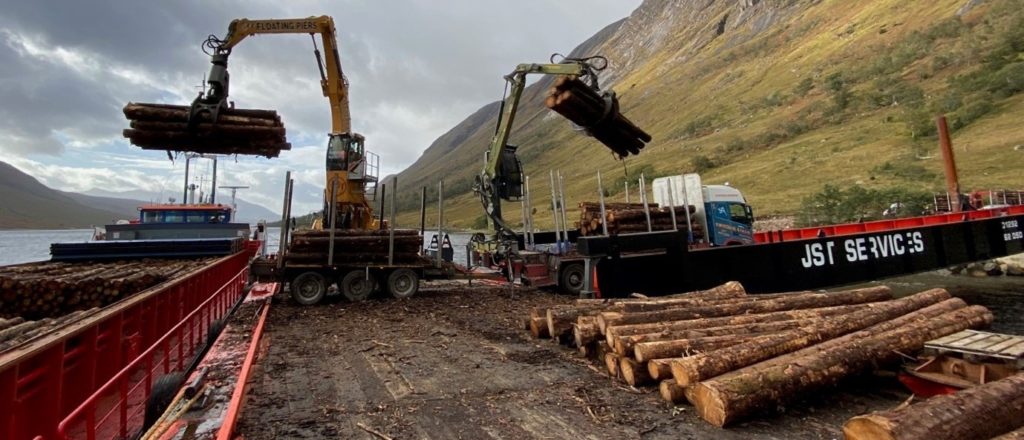NEWS & MEDIA
Shard Credit Partners goes on a Scottish road trip with JST Ports and Logistics Holdings Ltd
5 March 2024
JST’s floating pier operation at Loch Etive
It is difficult to imagine a more idyllic work location than on the shoreline of Loch Etive in the Scottish Highlands. We are several hours drive from Glasgow, which is 104 miles southwest of here. The land quickly steepens away from the loch and in every direction mountains carved out from the granite complex of Etive rise up to meet the skyline. Notable peaks include Ben Starav at 1,078 metres above sea level, visible in the photo above.
The area is sparsely inhabited, with the primary economic activities being tourism (hiking, fishing and deer stalking), shellfish harvesting, hydroelectric power generation and commercial forestry management. Timber production from sustainably managed forestry and timber processing is an important industry throughout the Scottish Highlands and Islands, contributing nearly £771 million to Scottish GDP annually. In areas that are sparsely populated and far from urban centres, the Scottish timber industry provides full time employment for 19,555 people (source: Scottish Forestry).

Loch Etive, around twenty miles long, is a sea loch which runs approximately north-east to south-west and bisects a designated ‘wild land area’ of 507 km2, just south of Glencoe. The area, largely uninhabited, is encircled by A roads (the A82 over Rannoch Moor and the A85 around Loch Awe), but the only vehicular access to the shores of the loch is via the twelve mile long single track Glen Etive road (made famous by the James Bond film ‘Skyfall’). This makes the high volume transportation of felled roundwood timber from the woodlands to processing centres located around the UK and elsewhere challenging, to say the least.
Loch Etive Woods is a designated special area of conservation spanning 2,643 hectares. 60% of this area is taken up by broad-leaved deciduous woodland comprising of ash, hazel and sessile oak habitats, but 3.5% is coniferous woodland. The Scottish Forestry Commission manage a couple of hundred acres of commercial pine forests bordering the loch, harvesting 30,000 tonnes of roundwood timber per annum. From here it must be transported tens, or hundreds of miles to processing centres as far afield as Birkenhead, where it can be turned into useful commercial products.

Such remoteness, combined with restricted vehicular access, pits the needs of the Scottish forestry industry against the needs of local tourism, upon which the local economy also depends. In order to prevent relentless summer traffic jams, clogging up single track lanes with articulated lorries transporting 25 tons per load of freshly harvested roundwood timber out of the forests and away to timber processing centres such as Fort William, alternative strategies must be seriously considered. JST Services (Scotland) Limited (“JST”), a portfolio investment company of Shard Credit Partners, has been innovating in this industry for several decades, becoming a reliable partner within the Scottish commercial forestry ecosystem.
Given the vast watery expanse of Loch Etive, which being a sea loch is conveniently linked to the open waters of the North Atlantic, transportation via ship provides a welcome alternative to road transportation. However, timber plantations can take several decades to mature, with relatively modest extraction volumes. This means it is uneconomical to construct and maintain a permanent pier or port infrastructure to moor sea vessels onto. To get around this, JST has invented the concept of the floating pier, which is movable, can be transferred from location to location by tug boat, and leaves virtually no impact on the local ecology when removed. JST operates three floating piers at remote locations throughout the Scottish Highlands.

The floating pier (shown in the photo above) consists of a steel bridge, which is connected to the shoreline at one end and is mounted on a recommissioned barge at the other, with a strengthened surface so that it can take the weight of a fully loaded timber lorry and a large crane. The timber is driven over the bridge and onto the floating pier, where it is lifted straight off the lorry and into the hold of a waiting cargo ship. Each ship can accommodate between 900 and 2,500 tonnes of roundwood logs, which takes JST’s skilled crane operators between a half and one full day to load each vessel.
The annual CO2 savings from transporting felled timber by sea, rather than by road, are significant. Each year around 30,000 tonnes of logs are expected to be moved by ship from the floating pier at Glen Etive to saw-mills in northern Scotland and north-west England, where they are turned into FSC-certified timber products for fencing, landscaping, cladding, house construction and furniture. Some 33 ships per year are expected to be moved from Glen Etive, producing an estimated 233 tonnes of CO2 when the final road miles and log handling equipment is factored in. If these logs were instead to be transported solely by road, the equivalent CO2 impact would be around three times at around 640 tonnes, generating a net saving of approximately 317 tonnes of CO2 annually and removing around 317,000 HGV road miles – even ignoring the negative impact and cost from HGV’s using unsealed Highland single-track roads and the impact on the tourist economy.
The floating pier operation at Loch Etive is just one example of how JST is bringing innovation to the transportation and logistics sector to facilitate the decarbonisation of the UK forest products industry. JST operates floating pier operations at two other locations in Scotland – one at Ardcastle on the western shore of Loch Fyne and another on the Morvern and Ardnamurchan Peninsulas in the West Highlands. In total, JST estimates its floating pier operations help to reduce emissions of CO2 produced as a result of timber transportation from Scotland to the rest of the UK by around 2,574 metric tonnes annually, saving 1.75 million HGV road miles per annum.
About Shard Credit Partners:
Shard Credit Partners is an alternative investment fund manager focused on high cash yielding private credit strategies in the UK lower mid-market. Current assets under management stands at circa £200 million. Its funds seek to generate superior risk-adjusted returns from conservatively structured senior secured credit investments with equity upside. Fund strategies include corporate direct lending, technology venture financing and international trade finance.
Shard Credit Partners successfully completed eleven primary investments and around thirty bolt-on acquisitions from its debut direct lending fund Shard Credit Partners Fund I, which held a first close in October 2017 at £90.2 million. Shard Credit Partners plans to hold a first close on its second vintage UK lower mid-market direct lending fund with a target of £100 million during Q3 2024.
Shard Credit Partners invests in small to medium sized businesses with strong management teams, supporting them by providing transformative growth capital and event driven financing in support of innovation, growth and expansion. The Fund invests in businesses across all sectors and throughout the UK. The firm has a strong ESG focus; in particular, it is a strong supporter of female entrepreneurs and firms with meaningful female leadership, ownership and senior management.
Shard Credit Partners Ltd is an Appointed Representative of Shard Capital AIFM LLP, authorised and regulated by the FCA (FRN 615463).
| Contact details: | Investor relations: IR@shardcreditpartners.com
Business: info@shardcreditpartners.com Website: www.shardcreditpartners.com |
